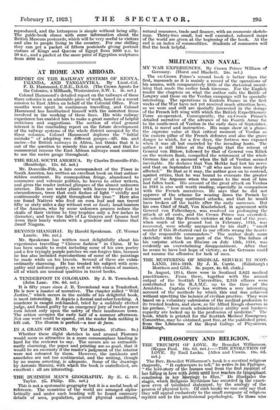MILITARY AND NAVAL.
MY WAR EXPERIENCES. By Crown Prince William of Germany. (Hurst and Blackett. 24s. net.)
The ex-Crown Prince's second book is better than the first, inasmuch as it is mainly a record of the operations of his armies, with comparatively little of the rhetorical moral- izing that made the earlier book tiresome. For the English reader the chapters on what the author calls the Battle of Longwy and those on the Verdun campaign will be specially interesting. The operations in Eastern France in the first weeks of the War have not yet received much attention -here, as we were and still are specially interested in the doings of the French left wing with which the British Expeditionary Force co-operated. Ccnsequently, the ex-Crown Prince's detailed narrative of the advance of his Fourth Army far to the south-west of Verdun in the early days of September, 1914, is novel and instructive. His maps show at a glance the supreme value at that critical moment of Verdun as the eastern pillar of the French defences and also the grave danger to which, for a few days, the fortress was exposed when it was all but encircled by the invading hosts. The author is still bitter at the thought that the retreat of General von Billow, followed by that of General von Kliick on the western flank, compelled the retirement of the whole German line at 'a moment when the fall of Verdun seemed inevitable. He declares that Von Moltke had lost his nerve and that on September 11th " all who saw him were deeply affected." Be that as it may, the author goes on to contend, against critics, that he was bound to evacuate the greater part of the Argonne when the armies to the west of him had fallen back. His account of the great attack on Verdun in 1916 is also well worth reading, especially in comparison with the French narratives. He says that he did not approve of the scheme for wearing down the French by incessant and long continued attacks, and that he would have broken off the battle after the early successes. But his own Chief of Staff, Von Knobelsdorf, in agreement with General von Falkenhayn, was resolved on prolonging the attack at all costs, and the Crown Prince was overruled. He admits that the. French victories at the end of the year, when much of the ground lost in February, 1916, was recovered, were wholly unexpected by his staff ; " small wonder if this ill-starred end to our efforts wrung the hearts of the responsible commanders." The author deals more sketchily with the later part of the War. The failure of his surprise attack on Rheims on July 15th, 1918, was evidently an overwhelming disappointment. After that he seems to have lost hope of victory, as the Germans could not resume the offensive for lack of men.










































 Previous page
Previous page